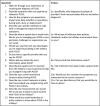The Experience of Living With Polycystic Ovary Syndrome in the Military
- PMID: 37405691
- PMCID: PMC11022330
- DOI: 10.1093/milmed/usad241
The Experience of Living With Polycystic Ovary Syndrome in the Military
Abstract
Introduction: Polycystic ovary syndrome (PCOS) is the most prevalent reproductive endocrinopathy in women, ranging from 5% to 26% depending on diagnostic criteria applied. Common manifestations of PCOS include overweight and obesity, abnormal menstrual cycles, pelvic pain, increased facial and body hair, acne, and infertility. These abnormalities and associated complications have significant military operational and readiness implications. There is a large gap in research regarding active duty servicewomen (ADW) with PCOS. Therefore, the purpose of this study is to describe ADW's experience of living with PCOS and to describe the service-branch-specific differences among these women.
Materials and methods: Moderator's guide, audiotapes, transcripts, and field notes. This was a qualitative descriptive study using focus groups and individual interviews. The David Grant Medical Center Institutional Review Board at Travis AFB, CA, USA, approved the study protocol. Women with PCOS were recruited from U.S. Air Force, Army, and Navy locations. Data were analyzed using constant comparative content analysis.
Results: Twenty-three servicewomen from 19 occupations across the Army, Navy, Air Force, and Marine Corps participated. Three overarching categories emerged: (1) challenges managing PCOS symptoms, (2) navigating the military health care system, and (3) navigating PCOS as a service member.
Conclusions: Servicewomen may have significant career consequences related to PCOS sequelae, such as overweight, obesity, uncontrolled menstrual cycle, and pain. Managing the myriad of symptoms can distract women while deployed, in austere conditions, or at their home stations. As one of the most common cardiometabolic, reproductive endocrinologic conditions in women, PCOS has not received the attention, awareness, education, or research necessary to sufficiently support ADW with this condition. It is imperative that evidence-based strategies are developed to inform relevant and high-quality care for these warfighters. Future qualitative studies are needed to further describe specific stressors and needs of ADW with PCOS. Future intervention studies are also needed to evaluate effective management options for ADW with PCOS.
© The Association of Military Surgeons of the United States 2023. All rights reserved. For permissions, please e-mail: journals.permissions@oup.com.
Conflict of interest statement
None declared.
Similar articles
-
Polycystic Ovary Syndrome in Active Duty Service Women: A Retrospective Analysis.Mil Med. 2019 Oct 1;184(9-10):440-446. doi: 10.1093/milmed/usz023. Mil Med. 2019. PMID: 30811534
-
Recommendations From the 2023 International Evidence-based Guideline for the Assessment and Management of Polycystic Ovary Syndrome.J Clin Endocrinol Metab. 2023 Sep 18;108(10):2447-2469. doi: 10.1210/clinem/dgad463. J Clin Endocrinol Metab. 2023. PMID: 37580314 Free PMC article.
-
Recommendations from the 2023 International Evidence-based Guideline for the Assessment and Management of Polycystic Ovary Syndrome.Fertil Steril. 2023 Oct;120(4):767-793. doi: 10.1016/j.fertnstert.2023.07.025. Epub 2023 Aug 14. Fertil Steril. 2023. PMID: 37589624
-
Direct economic burden of mental health disorders associated with polycystic ovary syndrome: Systematic review and meta-analysis.Elife. 2023 Aug 3;12:e85338. doi: 10.7554/eLife.85338. Elife. 2023. PMID: 37534878 Free PMC article.
-
Metabolic consequences of obesity and insulin resistance in polycystic ovary syndrome: diagnostic and methodological challenges.Nutr Res Rev. 2017 Jun;30(1):97-105. doi: 10.1017/S0954422416000287. Epub 2017 Feb 22. Nutr Res Rev. 2017. PMID: 28222828 Review.
Cited by
-
Polycystic ovary syndrome and chronic pain among females and individuals of childbearing age: A scoping review.SAGE Open Med. 2024 Jun 19;12:20503121241262158. doi: 10.1177/20503121241262158. eCollection 2024. SAGE Open Med. 2024. PMID: 38903491 Free PMC article.
-
Ovarian dysfunction and polycystic ovary syndrome in the U.S. military active component, 2014-2023.MSMR. 2025 Jan 20;32(1):11-17. MSMR. 2025. PMID: 39965137 Free PMC article.
References
-
- Hopkins D, Noursi S, Dihn N, Saluja B: Polycystic ovary/ovarian syndrome (PCOS) underrecognized, underdiagnosed, and understudied. National Institutes of Health: NIH Office of Research on Women’s Health 2019. Publication Number 19-OD-8095. Available at https://orwh.od.nih.gov/sites/orwh/files/docs/PCOS_Booklet_508.pdf; accessed February 22, 2023.
-
- Library of Congress: S.Res.670 - a resolution recognizing the seriousness of polycystic ovary syndrome (PCOS) and expressing support for the designation of September 2020 as “PCOS Awareness Month”. 116th Congress (2019-2020). Available at https://www.congress.gov/bill/116th-congress/senate-resolution/670?s=1&r=6; accessed February 22, 2023.
MeSH terms
Grants and funding
LinkOut - more resources
Full Text Sources
Medical
Research Materials
Miscellaneous


